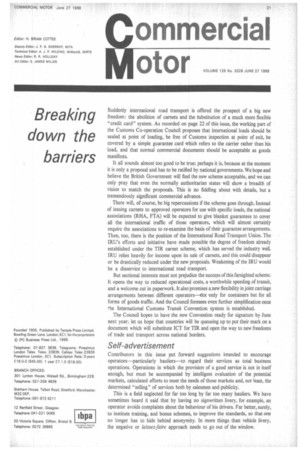Breaking down the barriers
Page 23

If you've noticed an error in this article please click here to report it so we can fix it.
Suddenly international road transport is offered the prospect of a big new freedom: the abolition of carnets and the substitution of a much more flexible "credit cardsystem. As recorded on page 22 of this issue, the working part of the Customs Co-operation Council proposes that international loads should be sealed at point of loading, be free of Customs inspection at point of exit, be covered by a simple guarantee card which refers to the carrier rather than his load, and that normal commercial documents should be acceptable as goods manifests.
It all sounds almost too good to be true; perhaps it is, because at the moment it is only a proposal and has to be ratified by national governments. We hope and believe the British Government will find the new scheme acceptable, and we can only pray that even the normally authoritarian states will show a breadth of vision to match the proposals. This is no fiddling about with details, but a tremendously significant commercial advance.
There will, of course, be big repercussions if the scheme goes through. Instead of issuing carnets to approved operators for use with specific loads, the national associations (RHA, FTA) will be expected to give blanket guarantees to cover all the international traffic of those operators, which will almost certainly require the associations to re-examine the basis of their guarantee arrangements.
Then, too, there is the position of the International Road Transport Union. The IRU's efforts and initiative have made possible the degree of freedom already established under the TIR carnet scheme, which has served the industry well. IRU relies heavily for income upon its sale of carnets, and this could disappear or be drastically reduced under the new proposals. Weakening of the IRU would be a disservice to international road transport.
But sectional interests must not prejudice the success of this farsighted scheme. It opens the way to reduced operational costs, a worthwhile speeding of transit, and a welcome cut in paperwork. It also promises anew flexibility in joint carriage arrangements between different operators—dot -only for containers but for all forms of goods traffic. And the Council foresees even further simplification once th.e International Customs Transit Convention system is established.
The Council hopes to have the new Convention ready for signature by June next year: let us hope that countries will be queueing up to put their mark on a document which will substitute ICT for TIR and open the way to new freedoms of trade and transport across national borders.
Self-advertisement
Contributors in this issue put forward suggestions intended to encourage operators—particularly hauliers—to regard their services as total business operations. Operations in which the provision of a good service is not in itself enough, but must be accompanied by intelligent evaluation of the potential markets, calculated efforts to meet the needs of those markets and, not least, the determined "selling" of services both by salesmen and publicity.
This is a field neglected for far too long by far too many hauliers. We have sometimes heard it said that by having no signwritten livery, for example, an operator avoids complaints about the behaviour of his drivers. Far better, surely, to institute training, and bonus schemes, to improve the standards, so that one no longer has to hide behind anonymity. In more things than vehicle livery, the negative or laissez-faire approach needs to go out of the window.


















































































































